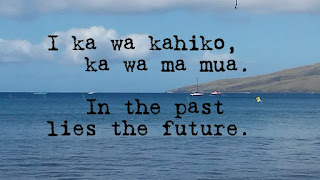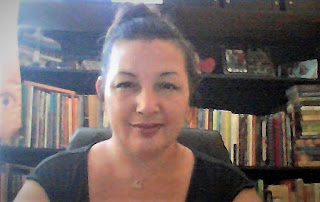In the Past Lies the Future
Lapita people landed on Hawaiʻiʻs shores for the first time before Christ was born. In really local context, Pōhakuokalani - which is today known as ʻĪao Valley, was said to have been settled before the first century BCE, as noted in The Waters of Kama which can be found at Hale Hōʻikeʻike.
For thousands of years before that, and again with subsequent migrations from Nuʻuhiwa and Tahiti, Kanaka Maoli have thrived in these islands without an issue. Living in harmony with the land meant that the land would provide. Aloha ʻĀina = ʻĀina Aloha
We all know the basic story-line of Captain Cook, but the exact story that fuels division unto this day is the very reason our island environments and the basic quality of life in Hawaiʻi struggles to thrive today, is the part that we are going to read about here. This part only causes confusion to those who are committed to remaining ignorant. Books are available. Today, the review is going to be much faster, to get to the point: I ka wā kahiko, ka wā ma mua.
Missionaries arrived in 1820 with good intentions and a financial sponsorship from ABCFM [the FM stands for Foreign Ministries]. A few decades later when the missionaries never returned to New England, the ABCFM realized that they were settling in "paradise" and ended the sponsorship. By this time, the first generations born here were used to life in Hawaiʻi. There was no need to return to the eastern competition when they were comfortable right here in Hawaiʻi. However as Americans, they were used to the idea that you can kick natives off their land and own it outright. Although this was new to Hawaiians, like the American Indians once said, Hawaiians advised against land ownership stating that the land was chief and we simply served the land. But being trumped with this new foreign money system, Hawaiians relied on these Americans who were in some cases, good friends. The year was roughly 1848.
Screaming about money and land ownership, the former missionary families and new whalers or businessmen who were becoming regulars to the islands began to make a lot of trouble and threaten Hawaiʻi. In being fair, the Great Mahele was drawn up and land commissions served to register the lands. Unfamiliar with these processes, many Hawaiians did not register. It was their understanding that one could not own land, and to their memory that we have always lived here. Why would anything change?
During this time, pineapples and coffee were introduced and degenerative farm practices overtook expansive tracts of land while Hawaiians died off from foreign diseases that plagued these islands like the Coronavirus just plagued the world. Soon, Hawaiʻi was filled with foreigners and all sorts of political war crimes were occurring. But there werenʻt enough Kanaka Maoli left to defend their country against the greedy businessmen whose hunger for capital gain was quickly becoming the Big 5 Corporations of Hawaiʻi. Soon, water was being diverted and Hawaiian taro farmers families found themselves poor, starving and without water. Modernization followed with the 1893 coup dʻetat to follow.
Soon to follow came the illegal annexation where America signed in agreement with America to annex Hawaiʻi, in a Joint Resolution with itself. Hawaiian language was banned, culture was banned and without consent, America developed the Organic Act of 1900 - where Senator Bacon and Senator Cullom had a lively debate during the 56th Congressional Debate of 1900 about the illegality but America proceeded with the denizen process.
While affairs led up to eventual statehood in 1959, more degenerative practices were being practiced in Hawaiʻiʻs fragile ecosystem began to cause life to go extinct here, while sacred places that just happen to scientifically be the resources that maintain life on these islands, are being destroyed at fast rates.
For those who donʻt know what these practices can do to a place, please google the history of:
Kahoʻolawe bombing vs Bikini Island bombing
Poor island environmental practices vs Rapa Nui
Poor overall environmental practices vs Kiribati
Industrialization vs Environment
Life in places where industrial accidents destroyed environments
Kanaka Maoli have literally thrived here for thousands of years with the environment. Today, due to industrialism, development and reckless draining of natural resources - the Earth altogether is in grave environmental danger. Itʻs in so much danger that the entire world is in debt and nobody knows to whom yet.
This hits home when I think about
- our dependence upon the barge for over 90% of our goods
- our dependence upon tourism which is wrecking our home
In the face of building our future economy, I hope to bring fresh new ideas to the table using a creative approach that includes ancient wisdom as well as that of modern savvy. Please remember at all times:




Comments
Post a Comment